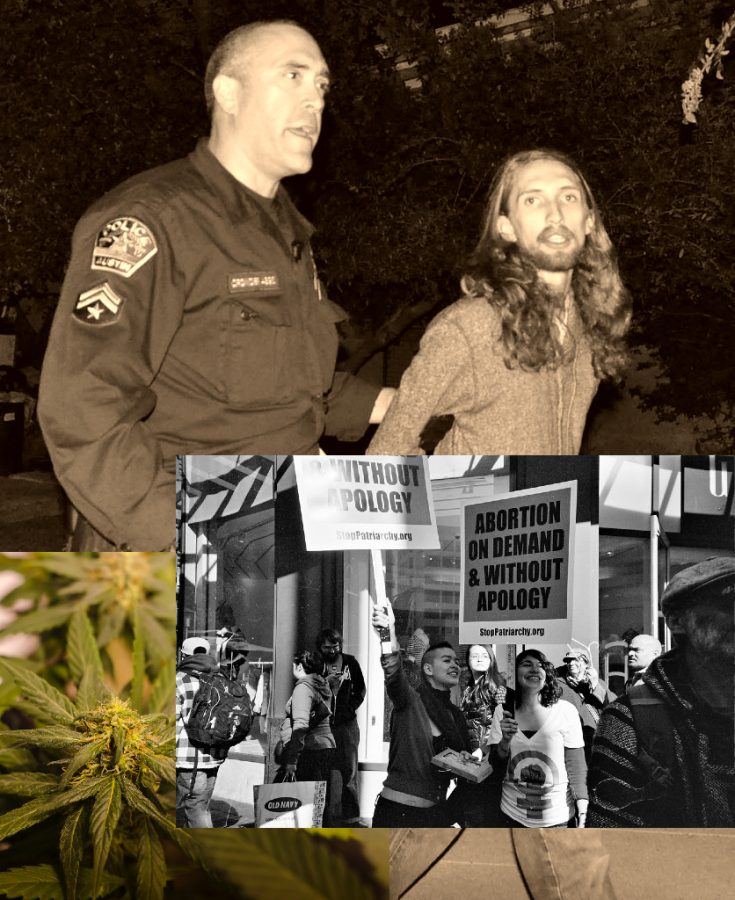New, controversial laws stir up mixed feelings among Texans
Graphic by Gracie Watt/Hilltop Views
New laws effective Sept. 1 influence issues including Abortion, Body-Word Cameras, Medical Marijuana etc.
On Sept. 1, 666 new laws were passed in Texas that cover a range of topics, including abortion rights, constitutional carry, vaccination passports and public school curriculum. I’ll break down a few of the laws that stuck to me the most. These are laws that not only affect my personal demographics and the lives of those around me at St. Edward’s University but also raise discourse between those on both sides of the political spectrum.
Vaccination Passports
It’s no secret that Gov. Greg Abbott disapproves of several COVID-19 restrictions many other states and countries enforce. He’s stated on social media that wearing a mask and deciding to get vaccinated is a “personal responsibility.” With SB 968, the controversy takes it a step further. With this new law, vaccine passports are now prohibited in Texas. This means businesses cannot legally enforce customers to prove their vaccination status.
This law is interesting, to say the least, because there are states like New York where the laws are the exact opposite. As someone who works part-time in a restaurant and is not required to wear a mask, I feel more vulnerable to the virus. I thought once more states began to enforce vaccination passports, Texas would follow suit, and my job would be a safer environment. Abbott clearly has other plans.
Constitutional Carry
House Bill 1927 states Texans are allowed to carry a handgun without taking any training courses or obtaining a license as long as they are 21 years old or older. Abbott stated this was not a law that protected gun rights, but rather a law that “instills freedom” in our state.
The debate on gun control has been going on for as long as I’ve been alive. I grew up running active shooter practice drills. Although I am very fortunate to have never experienced the tragedy of a school shooting, it’s a large fear I’ve constantly sat with. This year alone, Texas students experienced 135 school shootings, and it’s only September. The school year just started up again, so who knows how much that number will grow before the year ends, especially with this new law. It feels as if our governor is completely disregarding those numbers for the sake of making Texas feel more “free”, and a law like this one may have a direct impact on schools all across the state.
Critical Race Theory
When I was in the 5th grade, I remember doing a group project where we had to research a social study topic and present it to our class. The topic we picked was “Abolitionists”. At the time, I had no idea what that word meant; however, I walked away from that project with more knowledge of race than ever before.
With House Bill 3979, kids entering 5th grade may never gain the same insight I did at that age, nor will students in middle and high school be taught about how race and racism impact[ed] our country. This law only allows for a specific collection of documents to be taught, and teachers are also no longer allowed to assign anything that pertains to political activism.
Not only does this limit the conversations teachers and students should have, but it incorrectly depicts our state’s history. It also completely disregards racism as an issue that was very prevalent in our past, as well as our present. It encourages willful ignorance.
Criminalization of Camping
Homelessness is an ongoing issue in this state No matter how hard legislatures try, nothing has successfully eliminated it completely. Earlier this year, Austin reinforced its camping ban and criminalized panhandling. Our state government has gone a step further with House Bill 1925. This law states that camping in an unapproved public area will now be treated as a misdemeanor crime, and a $500 fine for those who are cited. The most interesting aspect of this new law, though, is the fact that cities cannot opt-out of this enforcement.
I find it ironic that our state will be passing out fines to those in poverty because it just adds to the list of many things those people cannot afford and it keeps that demographic poor.
Illegal Abortion
Yes, I did save the heaviest topic for last, and it’s probably the topic I am personally the most attached to, for obvious reasons. SB 8, also known as the “Heartbeat Bill”, now prohibits abortion once a fetal heartbeat is detected. This can be as early as six weeks, which is long before most women and individuals capable of childbearing know they are pregnant. The oddest part of this bill, though, is it does not allow an exception for victims of sexual assault or incest. If someone is sexually abused and pregnancy occurs as a result, the person will not have the chance to abort.
On top of that, the bill also gives people in Texas the ability to “snitch” on someone they believe is seeking an abortion and/or someone who may be offering the service. Even people who assist their pregnant friends or family members can be sued just for the act of driving them to a clinic. The only people who aren’t allowed to make accusations are state and local government officials.
With this law, Texas now has the strictest abortion rules of any state in the country. The two biggest worries most democrats and pro-choice advocates point out is how the bill disregards social work funding. This means there could be a large increase in the orphan population without compensation for those workers. The other worry surrounds the safety of those who seek an abortion. By making this form of health care inaccessible, it’s only going to prevent legal and safe abortions. Those wishing for one may seek alternate methods that are not nearly as safe as they’re promised, which comes with a list full of negative consequences, including sepsis, hemorrhages and genital trauma.
While the inclusion of these new laws, most of which I did not cover in this article, is an attempt to make our state feel freer and safer, there seem to be lines being crossed. Some of the bills passed ignore aspects of the U.S. Constitution, like separation of church and state and Roe v. Wade. Some bills also feel like they’re steps backward, moving us closer to a dark time in our history, while others are one step closer to a better future for Texas.

Claire is a senior Communication major with a minor in Journalism continuing to dedicate her time growing and learning as a student journalist. Claire...







